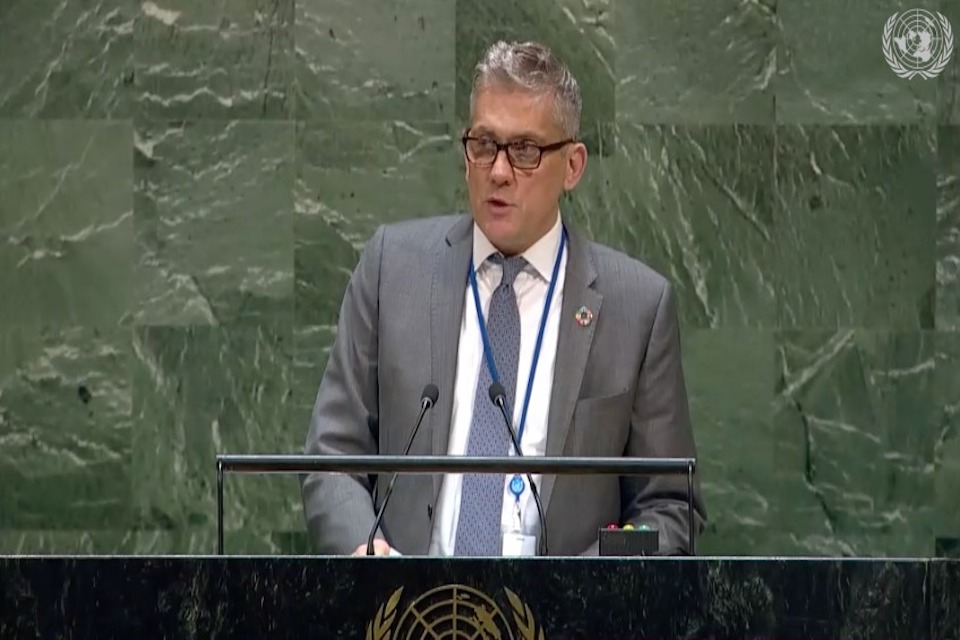Emphasising the importance of delivering principled humanitarian action to those who need it most
Statement by Tom Woodroffe at the General Assembly on strengthening of the coordination of humanitarian and disaster relief assistance at the UN.

Thank you Madam President and good afternoon, colleagues. And may I start by aligning the United Kingdom with the statement delivered by the European Union earlier this morning.
Mr President, the needs of people affected by crises around the world have never been as high or as pressing as they are today. In 2020, nearly 168 million people in 53 countries – and that is one in only 45 people in the world – will need humanitarian assistance and protection. In many cases, crises are lasting well over 10 years. We are facing an increasingly diverse range of crises: armed conflict that endangers millions of lives in Yemen, Syria, South Sudan and Nigeria; Ebola continues to threaten development in DRC and Uganda; and, as the tragic floods and cyclones in southern Africa have demonstrated, climate change has led to more frequent and extreme weather events. And violence against aid workers and violations of international law are on the rise.
In order to tackle these challenges, it is more important than ever for the international community to come together to harness our resources and ideas to anticipate better the humanitarian challenges and assist those most in need.
Mr President, the United Kingdom is proud to be the third largest bilateral donor of global humanitarian funds. We provide multi-year bilateral humanitarian funding to tackle over 30 crises, substantial core funding to the UN and Red Cross Movement, and have been the largest supporter of the Central Emergency Response Fund since its establishment. However, with crises affecting more people for longer periods of time, the international community needs to be better at supporting those most in need - even if it means doing things differently. Member states have provided a record $16 billion of humanitarian funding in 2019. But this is still not enough to cover global needs. So the UK continues to work towards a more efficient and effective humanitarian system. We are proud of our commitment to double our use of cash in crises by 2025 and are working with partners to drive better data and assessment of need as well as a response prioritisation. We are keen to explore how member states can renew momentum to deliver on humanitarian reform priorities. This includes fostering a more accountable humanitarian system, including to those it is there to serve. And we are keen to work together to develop a new and stronger approach to managing the risk of crises. As well as improving our responses, we must continue to improve the ways we anticipate and prepare for them. Disasters and crises should no longer be treated as unpredictable catastrophes. So to save lives, we need to act earlier and invest better in prevention, resilience, preparedness and risk financing. That is why the UK recently supported the launch of a Risk-Informed Early Action Partnership of the UN Climate Summit. This provides an exciting opportunity and a global platform to scale up investment in early action and preparedness.
Mr President, the UK would like to express its severe disappointment that member states have been asked to consider amendments today. We urge all states to reject any attempts to undermine sexual and reproductive health, rights and services. Gender equality and the empowerment of women and girls should be at the core of principal humanitarian action. Effective, equitable and participatory humanitarian action cannot be achieved without understanding and responding to the specific priorities and capacities of diverse women, girls, men and boys. And this includes ensuring women’s full, equal and meaningful participation in peace processes and their full enjoyment of all – and I stress all – their human rights. The UK is proud to be a global leader in efforts to eradicate all forms of violence against women and girls, including conflict related sexual violence and advancing sexual and reproductive health and rights. Our commitment remains unwavering and we will continue to push for these to be central to humanitarian responses.
In 2020, we will all need to do more to face the scale and severity of the challenge ahead. The UK will continue to fight towards delivering principled humanitarian action to those who need it most. We will continue to push for improved coherence to better tackle protracted crises and reduce humanitarian needs.
Thank you, Mr. President.